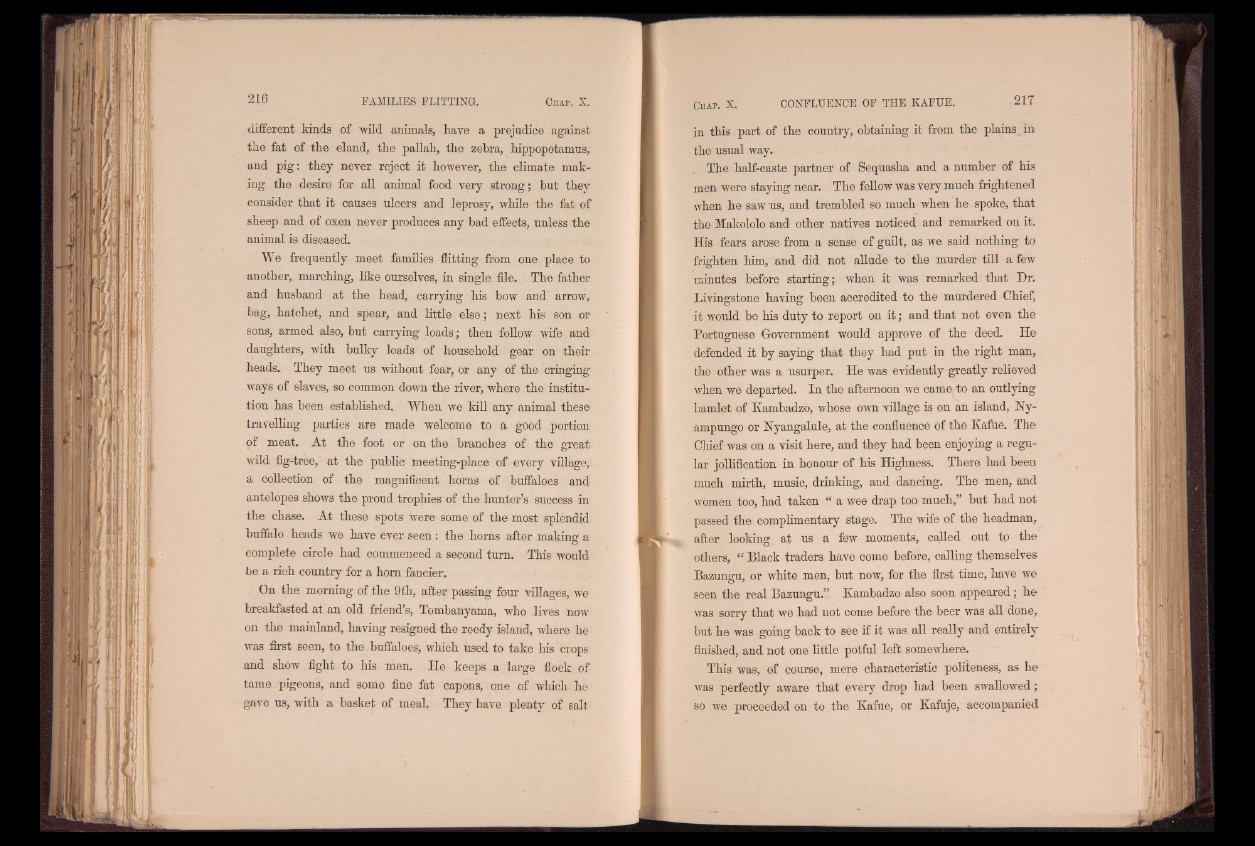
different kinds of wild animals, have a prejudice against
the fat of the eland, the pallah, the zebra, hippopotamus,
and pig: they never reject it however, the climate making
the desire for all animal food very strong; but they
consider that it causes ulcers and leprosy, while the fat of
sheep and of oxen never produces any bad effects, unless the
animal is diseased.
We frequently meet families flitting from one place to
another, marching, like ourselves, in single file. The father
and husband at the head, carrying his how and arrow,
bag, hatchet, and spear, and little else; next his son or
sons, armed also, but carrying loads; then follow wife and
daughters, with bulky loads of household gear on their
heads. They meet us without fear, or any of the cringing'
ways of slaves, so common down the river, where the institution
has been established. When we kill any animal these
travelling parties are made welcome to a good portion
of meat. At the foot or on the branches of the great
wild fig-tree, at the public meeting-place of every village,
a collection of the magnificent horns of buffaloes and
antelopes shows the proud trophies of the hunter’s success in
the chase. At these spots were some of the most splendid
buffalo heads we have ever seen : the horns after making a
complete circle had commenced a second turn. This would
be a rich country for a horn fancier.
On the morning of the 9th, after passing four villages, we
breakfasted at an old friend’s, Tombanyama, who lives now
on the mainland, having resigned the reedy island, where he
was first seen, to the buffaloes, which used to fake his crops
and show fight to his men. He keeps a large flock of
tame pigeons, and some fine fat capons, one of which he
gave us, with a basket of meal. They have plenty of salt
jn this part of the country, obtaining it from the plains , in
the usual way.
The half-caste partner of Sequasha and a number of his
men were staying near. The fellow was very much frightened
when he saw us, and trembled so much when he spoke, that
the Makololo and other natives noticed and remarked on it.
His fears arose from a sense of guilt, as we said nothing to
frighten him, and did not allude to the murder till a few
minutes before starting; when it was remarked that Dr.
Livingstone having been accredited to the murdered Chief,
it would be his duty to report on i t ; and that not even the
Portuguese Government would approve of the deed. He
defended it by saying that they had put in the right man,
the other was a usurper. He was evidently greatly relieved
when we departed. In the afternoon we came to an outlying
hamlet of Kambadzo, whose own village is on an island, Ny-
ampungo or Nyangalule, at the confluence of the Kafue. The
Chief was on a visit here, and they had been enjoying a regular
jollification in honour of his Highness. There had been
much mirth, music, drinking, and dancing. The men, and
women too, had taken “ a wee drap too much,” but had not
passed the complimentary stage. The wife of the headman,
after looking at us a few moments, called out to the
others, “ Black traders have come before, calling themselves
Bazungu, or white men, but now, for the first time, have we
seen the real Bazungu.” Kambadzo also soon appeared; he
was sorry that we had not come before the beer was all done,
but he was going back to see if it was all really and entirely
finished, and not one little potful left somewhere.
This was, of course, mere characteristic politeness, as he
was perfectly aware that every drop had been swallowed;
so we proceeded on to the Kafue, or Kafuje, accompanied